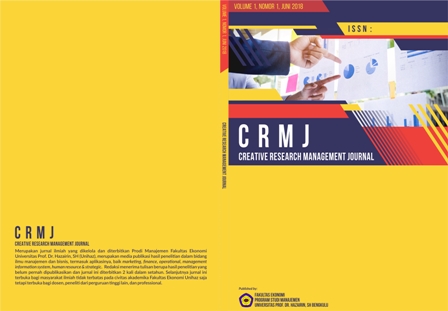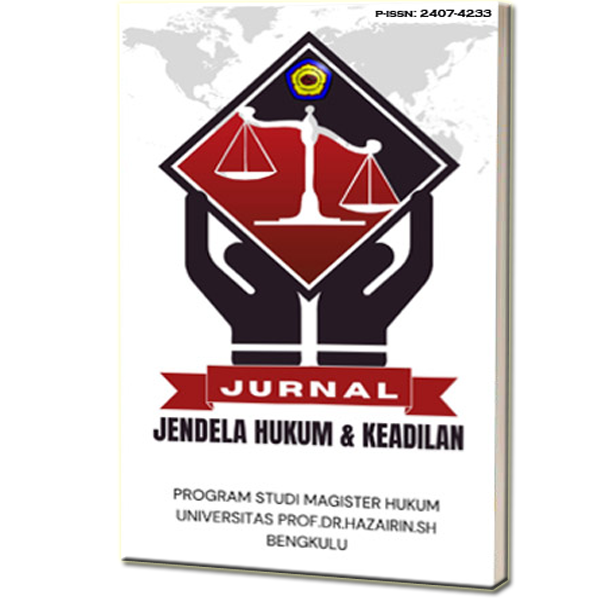Jurnal
-
CIVIL
Civil is a scientific journal for civil engineering researches published by the Civil Engineering Department, Faculty of Engineering, Universitas Prof. Dr. Hazairin, SH (UNIHAZ) Bengkulu, Indonesia. Each volume contains two editions. The first edition is published in June and the second one in December. This journal accommodates the research result in the area of civil engineering, i.e. Structural Engineering, Geotechnical Engineering, Transportation Engineering, Water Resources Engineering, Construction Management, and disaster management.
-
Jurnal Abdihaz
Abdihaz: Jurnal Ilmiah Pengabdian pada Masyarakat, so called as Jurnal Abdihaz, is a peer-reviewed journal to publish/disseminate scientific works and innovations in the form of scientific articles. This journal concerned with the practice and processes of community engagement. This journal accepts and publishes original scientific articles and focuses on community service. Jurnal Abdihaz is an applied science paper.
This journal publishes articles twice a year, i.e. June and December.
This journal has been accreditated by Republic of Indonesia Goverment as SINTA 3 from Vol. 1 No. 1 June 2019 to Vol. 5 No. 2 December 2023. -
Jurnal Agroqua: Media Informasi Agronomi dan Budidaya Perairan
Jurnal AGROQUA merupakan jurnal yang dikelola oleh Fakultas Pertanian dan diterbitkan oleh Universitas Prof. Dr. Hazairin, SH, di bidang agronomi dan budidaya perairan. Jurnal AGROQUA menyajikan artikel hasil penelitian di bidang agronomi dan budidaya perairan mutakhir yang meliputi bidang-bidang budidaya tanaman dan ikan, ilmu tanah, perlindungan tanaman dan ikan terhadap hama dan penyakit, teknologi hasil pertanian dan perikanan dan analisis usaha suatu teknologi budidaya tanaman dan perikanan.
-
Buletin Agroteknologi
Title: Buletin Agroteknologi
Management: Agrotechnology Study Program Universitas Prof Dr Hazairin SH
Publisher: Universitas Prof Dr Hazairin SH
Frequency: June and December
Coverage: International
Scope: Plant cultivation, plant breeding, plant biotechnology, plant diversity, soil science related to crop production, Science and technology of plant protection, economic analysis of crop cultivation technology, and Other topics related to plant production technology -
Creative Research Management Journal
Creative Research Management Journal is one of the scientific publication journals published by the Faculty of Economics and Business, Universitas Prof. Dr. Hazairin SH. The editors received writings in the form of research results that had never been published and this journal was published twice a year. Furthermore, this journal is open to the scientific community not limited to the Unihaz Faculty of Economics and Business academic community but is open to lecturers, researchers from other tertiary institutions, and professionals
-
Edu-Ling: Journal of English Education and Linguistics
Journal of Edu-Ling (Journal of English Education and Linguistics) is a scientific article in English Education Department in Faculty of Teacher Training and Education Prof. Dr. Hazairin, SH Bengkulu. It presents articles on English language teaching and learning, Linguistics and Literature. The contents include analysis, studies, application of theories, research reports, materials developments and reviews. This scientific article is published twice a year, with its published period in the months of July and December. Edu-Ling Journal is under licensed of Lembaga Ilmu Pengetahuan Indonesia (LIPI) by SK. No.0005.26147343/Jl.3.1/SK.ISSN/2018.02 with P-ISSN Number 2614-7343 and No.0005.26215128/Jl.3.1/SK.ISSN/2018.06 with E-2621-5128 for online version.
-
Jurnal Georafflesia : Artikel Ilmiah Pendidikan Geografi
Jurnal Georafflesia : Artikel Ilmiah Pendidikan Geografi adalah Artikel Ilmiah Pendidiikan Geografi di Program Studi Pendidikan Geografi Fakultas Keguruan dan Ilmu Pendidikan (FKIP) UUniversitas Prof Dr Hazairin S H Bengkulu Indonesia. Artikel ilmiah ini fokus pada permasalahan yang ada di Ranah keilmuan Kependidikan, Geografi Fisik dan Geografi Sosial. Ranah keilmuan Kependidikan adalah semua Artikel yang menjelaskan tentang masalah pendidikan di seluruh rumpun ilmu, Penelitian Tinddakan Kelas, Isu Pendidikan, Pendidikan Karakter dan Model Terapan Ilmu Kependidikan. Geografi Fisik adalah seluruh artikel dengan kajian kebumian pada keilmuan Geografi, Geologi, Geomorfologi, Hidrologi, Perencanaan Pengembangan Wilayah/ Keruangan, GIS dan Remote Seinsing. Geografi Sosial artikel yang diterbitkan berkaitan dengan masalah Sosial, Geografi Manusia, Demografi, Antropologi.
-
Jurnal Jendela Hukum dan Keadilan
Jurnal Jendela Hukum dan Keadilan Merupakan Jurnal yang diterbitkan oleh Program studi Magister Hukum Unihaz Bengkulu dengan Memuat Artikel-artikel yang berisikan Penelitian terkait bidang hukum yang meliputi Hukum Bisnis, Hukum Pidana, Hukum Publik dan Hukum Kesehatan. Jurnal Jendela Hukum dan Keadilan terbit 2 (dua) kali dalam setahun yaitu pada bulan Juni dan bulan Desember.
-
Jurnal Ilmu Akuntansi
JAZ : Jurnal Akuntansi Unihaz merupakan Jurnal Ilmiah yang mempublikasikan hasil-hasil penelitian empiris, studi teoritis dan pemikiran kritis dalam bidang akuntansi meliputi akuntansi keuangan, akuntansi sektor publik, akuntansi manajemen, perpajakan, auditing, dan sistem informasi akuntansi. Dalam proses review artikel, Jurnal JAZ menerapkan sistem penelaahan tertutup dua arah (double-blind review), dimana nama reviewer dan nama penulis tidak diketahui (anonim). Jurnal ini dikelola oleh Program Studi Akuntansi Unihaz (JAZ) Fakultas Ekonomi Universitas Prof. Dr. Hazairin, SH Bengkulu dan diterbitkan oleh Program Studi Akuntansi Fakultas Ekonomi Universitas Prof. Dr. Hazairin, SH Bengkulu dengan frekuensi penerbitan dua kali dalam setahun, yaitu bulan Juni dan Desember.
-
MAJALAH TEKNIK SIMES
SIMES is a scientific journal for research in the field of mechanical engineering and civil engineering, published by the Department of the Faculty of Engineering, Prof. Dr. Hazairin, SH (UNIHAZ) Bengkulu. Indonesia. Majalah Teknik Simes is a peer-reviewed journal published by the Faculty Of Engineering Universitas Prof. Dr. Hazairin, SH Bengkulu. Majalah Teknik Simes is published two times annually, in January and July. Majalah Teknik Simes provides a place for academics, researchers, and practitioners to publish scientific articles. The scope of the articles listed in this journal is related to various topics such as Civil Engineering, Mechanical Engineering, Architecture, Electrical Engineering, Industrial Engineering, Engineering Education, and other related engineering fields.
-
Masyarakat Demokrasi - Jurnal Ilmiah Administrasi Publik
Jurnal Masyarakat Demokrasi adalah jurnal ilmiah yang diterbitkan oleh Magister Administrasi Publik Universitas Prof. Dr. Hazairin, SH Bengkulu. Secara filosofis penamaan jurnal “Masyarakat Demokrasi†adalah impian segenap bangsa untuk mewujudkan masyarakat yang dinamis dan aktif di dalam proses bernegara, sehingga Masyarakat Demokrasi akan melahirkan Negara Kesejahteraan (Welfare State). Jurnal Masyarakat Demokrasi memuat tulisan dari kalangan akademisi, teknokrat maupun profesional yang konsren terhadap perkembangan Administrasi Publik secara keilmuan maupun praktik kesehariannya.
-
Mimbar : Jurnal Penelitian Sosial Dan Politik
Mimbar Journal is scientific journal dedicated to development of Social Sciences the article is based on the field research finding and published in each six months regularly by then management of Faculty Social and Political Sciences University Prof. Dr. Hazairin, SH. this journal is under licensed of Lembaga Ilmu Pengetahuan Indonesia (LIPI) by SK. No. 005.053/JI.32/SK.ISSN/2012 with ISSN Number 22525270 (Media Cetak) and SK No. 0005.26206056/JI.3.1/SK.ISSN/2018 With ISSN Number 26206056 (online).
The Journal accredited by the Indonesian Ministry of Research, Technology and Higher Education SK Nomor 30/E/KPT/2019, accreditation ranking category in SINTA 4. This journal is proposing the accreditation process starting from the publication of Vol. 6 No. 4 December 2017- Vol. 8 No. 1 Juni 2019 the journal's editors said that the articles are in the accreditation process that included at an accredited journal articles.
-
PARETO : Jurnal Ekonomi dan Kebijakan Publik
PARETO : Jurnal Ekonomi dan Kebijakan Publik merupakan Jurnal Ilmiah yang mempublikasikan hasil-hasil penelitian empiris, studi teoritis, dan pemikiran kritis dalam Bidang Ekonomi dan Kebijakan Publik; meliputi kajian ekonomi pembangunan, ekonomi pertanian, fiskal dan moneter, maupun ekonomi publik dan keuangan daerah. Cakupan kajian dapat berskala lokal, nasional, maupun internasional. Dalam proses review artikel, Jurnal PARETO menerapkan sistem penelaahan tertutup dua arah (double-blind review), dimana nama reviewer dan nama penulis tidak diketahui (anonim). Jurnal ini dikelola oleh Program Studi Ekonomi Pembangunan Fakultas Ekonomi Universitas Prof. Dr. Hazairin, SH. Bengkulu dan diterbitkan oleh Fakultas Ekonomi Universitas Prof. Dr. Hazairin, SH. Bengkulu dengan frekuensi penerbitan dua kali dalam setahun, yaitu bulan Juni dan Desember.
-
Psikodidaktika
The journal psikodidaktika is scientific article in prodi guidance and counseling Education Faculty of Teacher university Prof.Dr.Hazairin, S.H Bengkulu. Scientific article contains about writings relating to the science education, the science of psychology and guidance and counseling. Scientific article is rising twite a year published periode in December and June. Terakreditasi Sinta 4
-
SAINTIK : Jurnal Sain Informatika, Sistem dan Teknologi Informasi
SAINTIK : Jurnal Sain Informatika, Sistem dan Teknologi Informasi, with registered number ISSN 0000-0000 (print), 0000-0000 (online) is a scientific journal managed by Department of informatics and published by Universitas Prof. Dr. Hazairin, SH is a peer-reviewed journal published two times a year (May and November). The SAINTIK invites manuscripts in the various topics include, but not limited to Informatics, Information Systems, Computer Engineering.
















